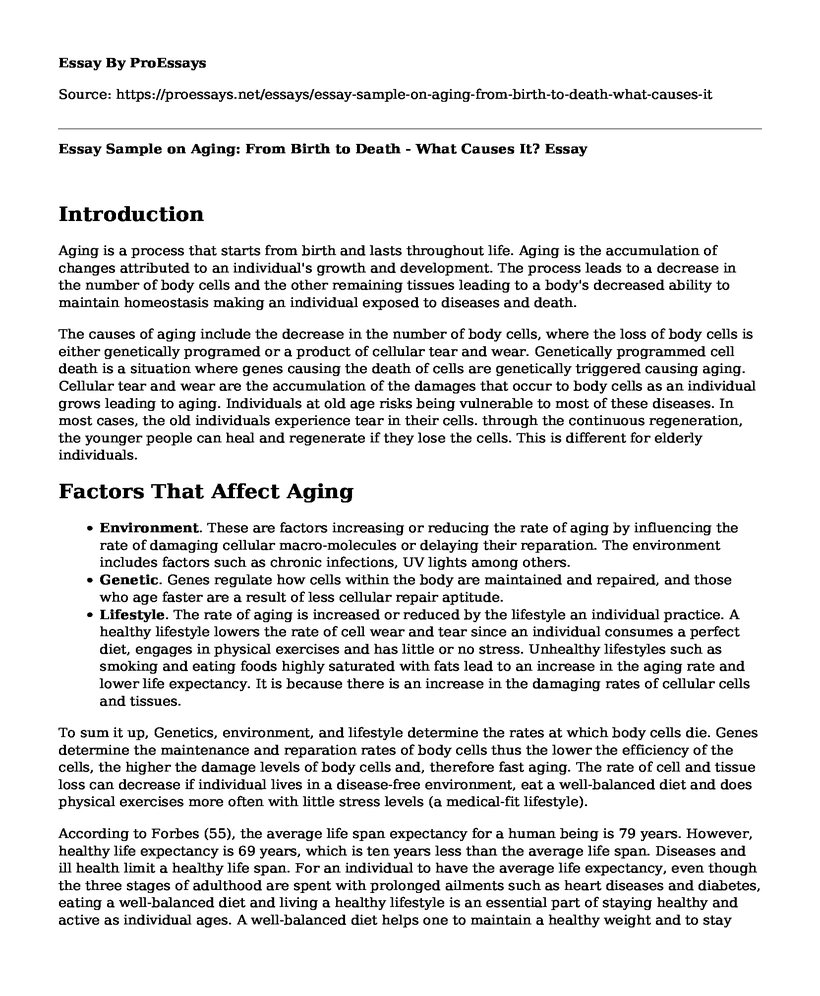Introduction
Aging is a process that starts from birth and lasts throughout life. Aging is the accumulation of changes attributed to an individual's growth and development. The process leads to a decrease in the number of body cells and the other remaining tissues leading to a body's decreased ability to maintain homeostasis making an individual exposed to diseases and death.
The causes of aging include the decrease in the number of body cells, where the loss of body cells is either genetically programed or a product of cellular tear and wear. Genetically programmed cell death is a situation where genes causing the death of cells are genetically triggered causing aging. Cellular tear and wear are the accumulation of the damages that occur to body cells as an individual grows leading to aging. Individuals at old age risks being vulnerable to most of these diseases. In most cases, the old individuals experience tear in their cells. through the continuous regeneration, the younger people can heal and regenerate if they lose the cells. This is different for elderly individuals.
Factors That Affect Aging
- Environment. These are factors increasing or reducing the rate of aging by influencing the rate of damaging cellular macro-molecules or delaying their reparation. The environment includes factors such as chronic infections, UV lights among others.
- Genetic. Genes regulate how cells within the body are maintained and repaired, and those who age faster are a result of less cellular repair aptitude.
- Lifestyle. The rate of aging is increased or reduced by the lifestyle an individual practice. A healthy lifestyle lowers the rate of cell wear and tear since an individual consumes a perfect diet, engages in physical exercises and has little or no stress. Unhealthy lifestyles such as smoking and eating foods highly saturated with fats lead to an increase in the aging rate and lower life expectancy. It is because there is an increase in the damaging rates of cellular cells and tissues.
To sum it up, Genetics, environment, and lifestyle determine the rates at which body cells die. Genes determine the maintenance and reparation rates of body cells thus the lower the efficiency of the cells, the higher the damage levels of body cells and, therefore fast aging. The rate of cell and tissue loss can decrease if individual lives in a disease-free environment, eat a well-balanced diet and does physical exercises more often with little stress levels (a medical-fit lifestyle).
According to Forbes (55), the average life span expectancy for a human being is 79 years. However, healthy life expectancy is 69 years, which is ten years less than the average life span. Diseases and ill health limit a healthy life span. For an individual to have the average life expectancy, even though the three stages of adulthood are spent with prolonged ailments such as heart diseases and diabetes, eating a well-balanced diet and living a healthy lifestyle is an essential part of staying healthy and active as individual ages. A well-balanced diet helps one to maintain a healthy weight and to stay energized throughout the early, middle and late adulthood stage of life.
Malnutrition and Aging Process
Sufficient nutrition aims to increase not the only number of years of a healthy life but also the life expectancy of human beings. To achieve perfect nutrition, one has to eat a healthy diet, rich in essential nutrients, every day because, as individuals ages, their susceptibility to diseases increases. Malnutrition arises where an individual can't afford and consume socially acceptable foods, reduced food intake, decreased nutrient absorption, and utilization and increased requirements due to injury or surgery and increased losses due to diseases and their medication.
Nutrition for older adults and the aging process: When an individual is at the late adulthood stage of life, there is the need for intake of a few calories since the adults are not active; hence, excess energy giving food intake reduces. The essential nutrients for consumption by adults are protein, calcium, vitamin D, water, and fiber, etc.
Consequences of Aging
The physiological consequence of aging, as individual ages, sensory abilities such as taste and smell at the age of 60 years reduces. A decline in the visual ability of the individuals and macular degeneration causes blinding of these individuals. Change in muscle strength characterized by general weakness, impaired mobility and balance due to the decrease in the muscle mass and increase in body fats.
Medical consequences of aging, aging process increase the number of chronic and acute illnesses such as diabetes, cardiovascular infections, cancer, hypertension and arthritis (Forbes 101). These diseases lead to a decrease in mobility (arthritis), dementia (alcoholism and Alzheimer's disease), increased and decreased appetite, absorption rates, metabolism and excretion due to drugs taken.
Socio-economic consequences of aging include low income levels since most members of the aging population are retirees, high poverty levels because of the large lot of finances to treat and take care of the aging and dependent living where the aging depend on their families, for instance, to drive them to a picnic instead of using that time to develop the economy.
Works Cited
Forbes, Gilbert B. Human body composition: growth, aging, nutrition, and activity. Springer Science & Business Media, 2012. 2-349. Retrieved from https://books.google.co.ke/books?hl=en&lr=&id=A9XTBwAAQBAJ&oi=fnd&pg=PA1&dq=Human+Nutrition:+Nutrition+and+aging+&ots=mm_xsIYRb1&sig=wXQdDmOp6nSXpk6LrPuiOSWsbx4&redir_esc=y#v=onepage&q=Human%20Nutrition%3A%20Nutrition%20and%20aging&f=false
Cite this page
Essay Sample on Aging: From Birth to Death - What Causes It?. (2023, Mar 12). Retrieved from https://proessays.net/essays/essay-sample-on-aging-from-birth-to-death-what-causes-it
If you are the original author of this essay and no longer wish to have it published on the ProEssays website, please click below to request its removal:
- 25 Things About Me - A Personal Essay Example
- Essay Sample on Hyperthymesia
- Stress Management Annotated Bibliography
- Anxiety and OCD Essay Example
- Essay Sample on the Mental Health of Teens and Depression
- Article Analysis Essay on Complicated Grief
- Essay Sample on Exploring the Multifaceted Notions of Leisure: A Personal Perspective







